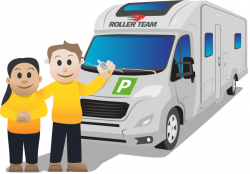
It's your first trip out in the UK
Traverling around the UK?
-
UK roads
Overview
Welcome to a brief overview of the distinctions between driving in the UK and the EU, along with some insights into motorhome ownership. The primary variation between UK and EU driving lies in the side of the road you navigate, with the UK driving on the left. However, motorhome ownership in the UK may come with a few more limitations compared to our European counterparts.
In the UK
In the UK, the roads can present challenges, particularly in areas such as Wales, Cornwall, Devon, and Scotland. These regions, known for their picturesque beauty, often feature rural and single-track roads that can be intricate to navigate. While these charming locales are best explored through small country lanes or single-track roads, they may not be the most accommodating for vehicles around 2.5 meters in width. Yet, with careful handling and courtesy, traversing such roads is usually manageable. Yielding to oncoming traffic is a wise approach to avoid potential damage to your motorhome or other vehicles.
Unlike EU
Unlike many EU countries, taking a brief break during your journey often requires stopping at a layby or service station. While these options might not be optimal, alternatives exist, such as seeking out a nearby pub under schemes like 'the britstop,' which not only serves as a break but also supports local establishments. Supermarkets can be a challenge due to height restrictions, leading you to larger stores outside towns. Google Maps, specifically Street View, can help determine the feasibility of parking at a given location.
Parking in towns
Parking in towns presents its own set of challenges, with restrictions favoring smaller cars and potential extra environmental charges, like ULEZ (Ultra Low Emission Zone). Motorhome speed limits also vary: dual carriageways permit speeds up to 70 mph for vehicles under 3.5 tonnes, while heavier ones must maintain a maximum of 60 mph. On single carriageways, limits are set at 60 mph for lighter motorhomes and 50 mph for heavier ones. Motorway speeds typically reach 70 mph, although trailers over 12 meters in length are restricted to 60 mph.
Your Driving Licence
For driving licenses, a typical motorhome falls into Category B, allowing you to operate motorhomes weighing up to 3,500 kg. If your motorhome falls between 3.5 and 7.5 tonnes, a Category C1 license is required, often granted under grandfather rights on existing licenses.
In essence
In essence, while the UK and EU roads may differ, motorhome enthusiasts can still explore the scenic beauty of the UK with some careful consideration, preparation, and adherence to regulations.
-
Navigating around the UK
With thoughtful preparation, many of these challenges can be effectively managed, leaving you with an exceptional way to explore the wonders of the UK.
- To steer clear of challenging roadways, some adjustments to your route planner might be necessary, potentially involving a slight deviation from the direct path and incorporating a stop at one of the numerous pubs that warmly welcome motorhomes for a lunch break. While this could extend your journey slightly, it will leave you feeling more revitalized upon arrival.
- For accessing the most picturesque destinations, you could consider augmenting your Motorhome itinerary with the inclusion of a bicycle or taking advantage of the excellent public transportation options available throughout the UK. Alternatively, you might opt to invest in a tow car, granting you unparalleled freedom of movement.
- Although we lack the charming Aires commonly found elsewhere, the UK offers a plethora of pub stops and even the option to explore some phone apps to locate a resting spot near a local beauty spot. Doing so will allow you to genuinely embrace the experience of motorhome travel.
- Through careful pre-planning, you can ensure a well-stocked supply of essentials. Many motorhomes provide ample storage capacity, enabling you to go several days without the need for shopping or restocking, as you can obtain supplies directly from your site. There's truly nothing like beginning your day with a fresh, locally baked bread or farm-fresh eggs.
- By strategically selecting your camping sites based on their location, you often have the opportunity to take advantage of local transportation options, such as buses into town. Alternatively, if you've brought along bicycles, they could serve as the perfect mode of exploration. Many sites even offer bike rentals for your convenience.
What will I need?
-
Your Motorhome Garage
Getting it ready
- When getting your motorhome ready for your journey, keeping track of its weight is crucial. It's a good idea to adopt a simpler approach while still holding onto the essentials.
Your Tavel plans
Your travel plans will be shaped by factors like weather conditions and the type of vacation you're aiming for. For example, if you're thinking of tackling the stunning Ben Nevis for its incredible vistas, the items you'll need will differ quite a bit from what's required for a relaxed beach getaway.
Rundown
Here's a rundown of items to consider for your motorhome adventure:
- Basic Toolkit: No need to lug around an entire mechanic's toolbox. Usually, if something beyond simple screw tightening is needed, you can contact a garage or your breakdown service. A versatile multi-toolkit should suffice.
- Outdoor Folding Seats: These seats come in various levels of comfort and collapsibility. They'll be a real treat during your travels. Remember, though, that taking different seat styles occupies precious space.
- Ground Sheet: A breathable awning groundsheet protects your feet and keeps the inside cleaner. It's especially helpful after outdoor activities.
- Small Folding Table: Perfect for those warm evenings when you just want to relax outdoors.
- EHU Cable: Around 25 meters long, this cable is slightly different from a regular extension cable. It's made of higher-quality material and has a load capacity greater than 16 amps. It's equipped with a CEE 17 plug at one end and a female connector at the other, specifically tailored for motorhome use.
- Levelling Chocks: These wedge-shaped ramps help level your motorhome, ensuring appliances like the fridge work properly. Plus, they eliminate the feeling of being off-kilter inside.
- Collapsible Bucket: You'd be surprised at how many tasks a bucket can tackle. It's a versatile tool for various needs.
- Hosepipe and Fittings: Around 10-15 meters in length, this hose should feature a universal hose connector (hoselock type) and a fitting that goes into your motorhome's water storage tank. Having a screw-type converter on hand is also wise.
- Bungee Straps: These versatile straps have countless uses, from securing items to holding things down.
- Gas Bottle Spanner: Needed for attaching or detaching the gas bottle hose. Some hoses might have hand-screw attachments, so check yours.
- Tent Pegs or Ground Pegs: In case the wind picks up, these are handy for securing your groundsheet and furniture.
- Awnings: If you have an awning, make sure to carry awning straps. This will help prevent damage caused by unexpected winds.
- Gas Bottle: If your motorhome doesn't have one already, having a gas bottle is crucial for cooking and heating.
- Mud Mats: These come in handy if it gets wet. Placed under the driving wheels, they provide traction in slippery conditions.
- Tow Eye Screw: This threaded bar with a ring is a lifesaver if you get stuck. It allows you to attach a tow rope without damaging your motorhome's suspension arm.
Remember
Remember, this list can be customized based on your specific trip. It's always a good idea to take a short trial vacation close to home to iron out any kinks before embarking on a longer journey. You'll be amazed at what you can learn from this experience.
-
Essential Living Accessories
Making Your Rolling Home Feel Just Like Home
- Entertainment on the Go
You might be out exploring, but rainy days happen. A TV could be your rainy day hero. Opt for a motorhome-friendly version that runs on 12 volts – perfect for when you're off the grid. - Snuggle-Worthy Bedding
Your bed should be a haven. Keep it simple with a duvet, sheet, and pillows. Adding a mattress topper can take your sleeping game up a notch. - A Cleaning Crusade
Staying sane on the road means keeping things tidy. A rechargeable handheld vacuum will be your cleanliness sidekick. - Cleaning Magic with Minimalism
You don't need a ton of cleaning products. Everyday stuff like dish soap, lemon, and white vinegar can work wonders. - Plates of Wonder
Consider 'Melamine' plates – they're practically indestructible and super light, making dining a breeze. - Cutlery Counts
Pack enough cutlery for your crew, plus a couple of extras. No need to prepare a feast; simple and practical wins the day. - The Toilet Chronicles
Don't skimp on the TP, but opt for the lighter stuff to avoid plumbing mishaps. And yes, there's a rainbow of toilet chemicals, each with its superpowers. - Towels Galore
Keep yourself dry, your face fresh, and your dishes clean with a stash of towels and cloths. - Kitchen Essentials
Dishcloths, scourers, and a trusty bowl for dish hauling – these are your kitchen buddies. And let's not forget, the BBQ often steps up as the kitchen extension! - Privacy Matters
Those external screen blinds are lifesavers. They keep the temperature comfy and give you a private haven at night. - Tools of the Trade
Equip yourself with the basics: tin and bottle openers, cheese graters, sharp knives, and even a corkscrew for those special evenings. - The Mighty Kitchen Kettle
Can't do without that cuppa, right? A trusty kettle is essential for your gas hob adventures.
- Entertainment on the Go
-
Driving Accessories
Driving your motorhome might seem a bit intimidating at first, but with a few handy additions, it can actually turn into a more enjoyable experience than your typical daily commute.
- A SatNav, especially one tailored for motorhomes, can be your guiding light to a stress-free journey. It's like having your very own travel angel ensuring you arrive at your destination hassle-free. And just in case your SatNav decides to act up, having a trusty UK Road Atlas as a backup can be a lifesaver.
- Ever bumped your wing mirror and felt a sting in your wallet? Mirror Protectors are a lifesaver, especially while you're still getting the hang of maneuvering your new motorhome. Investing in these can save you from shelling out for a replacement mirror, which can cost over £100.
- A hands-free phone device is a must, doubling up as a mobile phone holder. This little addition can keep your attention on the road while ensuring you're always within reach.
- Don't forget creature comforts! A drinks holder can make those scenic stops even more enjoyable. And speaking of capturing the scenery, a Dash Cam might not always be necessary, but it's good to have just in case. There are times when other drivers can get a bit impatient, and having video evidence can be a saving grace.
- Safety first, always. A well-stocked First Aid Kit is a no-brainer. Hopefully, you'll never need it, but it's always better to be prepared.
- Now, breakdowns happen to the best of us. So, having breakdown cover for your motorhome is a smart move. If you're planning to venture into the EU at any point, make sure to include this coverage when you make your purchase. It's often trickier to add it on later.
- Remember, with the right gear and a positive outlook, driving your motorhome can turn into a wonderful adventure every time you hit the road.

